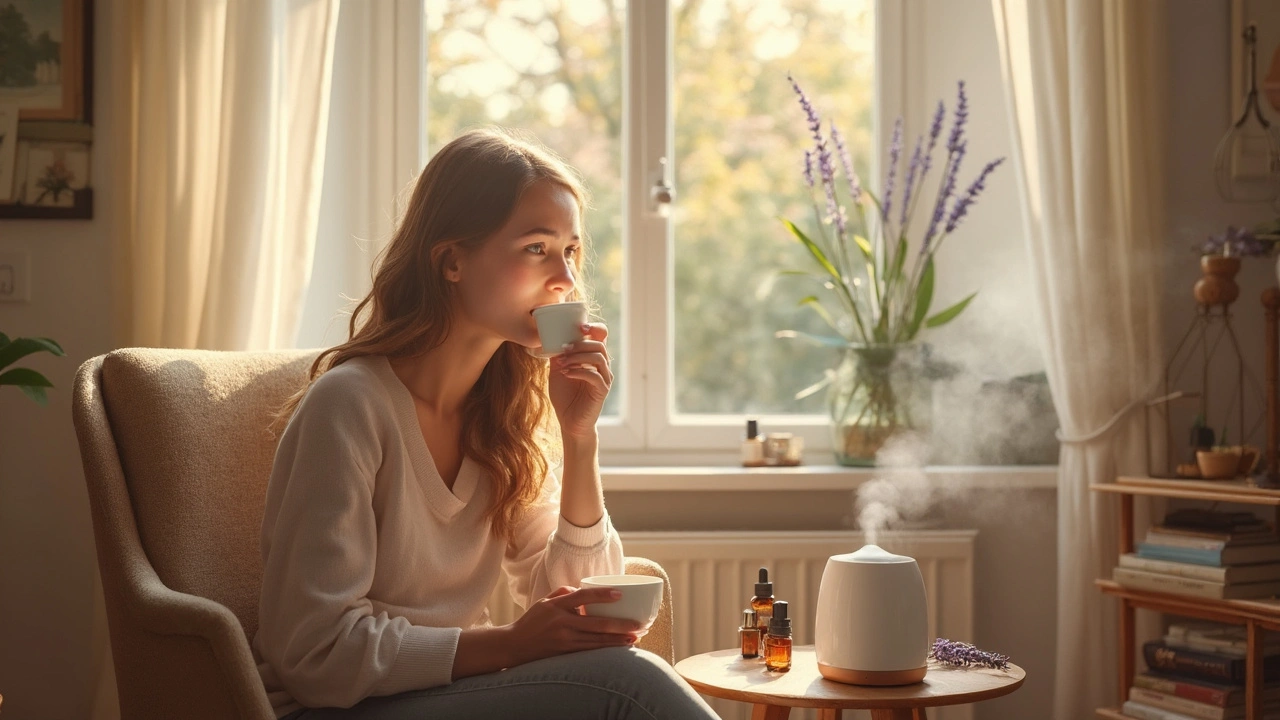Ever feel like your stress is running the show? Aromatherapy makes calming down way simpler than you think. Forget fancy setups or confusing gadgets—most of these techniques need only a few drops of oil, a tissue, or a quiet minute or two.
Start with the basics: certain scents really do signal your brain to chill out. Lavender, for example, has been shown in real studies to help people sleep better and ease anxiety. Citrus oils can lift your mood fast, and eucalyptus is great if your stress comes with tension headaches or stuffy sinuses.
You don’t need to invest a lot of money to try this out. Even just sniffing a drop of oil from your wrist or adding a few drops to a cotton ball does the trick for many people. The real magic is in how easy it is to fit into real life—you can use these tricks before a work meeting, after a long day, or even during a quick break at your desk.
- Why Aromatherapy Works for Stress Relief
- Choosing the Right Essential Oils
- Easy Aromatherapy Methods You Can Try
- Tips for Safe and Effective Use
Why Aromatherapy Works for Stress Relief
Here’s the deal: your nose is basically a shortcut to your brain. When you inhale the right smell, it goes straight to the part of your brain that handles emotions, memories, and—yes—stress. Scientists call this the limbic system. It’s why certain scents can trigger memories or make you feel instantly calmer or happier.
Aromatherapy for stress relief works because essential oils contain natural compounds that can trigger these feel-good brain responses. Lavender oil, for example, is famous for helping with anxiety and promoting sleep because it has linalool, a compound that tells your nervous system to relax. Citrus oils like orange and lemon have been shown to lower stress by boosting serotonin, your body's natural "happy chemical."
- Lavender: Linked to lower heart rate and calmer breathing. People exposed to lavender before stressful exams had lower anxiety scores, according to studies from Japan and the UK.
- Bergamot: Used in many waiting rooms to ease nerves and has even been shown to reduce cortisol (that’s your main stress hormone) in saliva samples.
- Eucalyptus: Offers a cooling, mind-clearing effect that’s a lifesaver when stress comes with headaches or mental fog.
If you’re a numbers person, check out how people respond to basic essential oils versus regular air in short-term stress situations:
| Oil Used | % Reporting Less Stress |
|---|---|
| Lavender | 73% |
| Orange | 67% |
| No Scent | 30% |
The takeaway? With a little bit of the right scent, your brain gets real help taking things down a notch. No complicated routines needed. Essential oils are a direct, fast way to flip your nervous system from "fight or flight" to "rest and digest." That’s why using aromatherapy for stress relief actually makes a difference.
Choosing the Right Essential Oils
Not every oil is created equal when it comes to aromatherapy and stress relief. It’s all about finding the scents your brain responds to, and knowing what each one does best. If you’re just starting out, don’t overthink it—these classic oils make a good starter kit:
- Lavender: The number one pick for calming nerves and helping sleep. Studies from big universities show it really can drop your heart rate and help you relax.
- Bergamot: This citrus oil is famous for boosting mood and reducing tension, especially if you’re feeling low or overwhelmed. It’s a go-to if you want the calming effect but also want to feel more upbeat.
- Chamomile: Great for winding down at night or dealing with anxiety. It’s a favorite for people who carry their stress in their stomach.
- Rose: This one’s a bit pricier, but a recent sleep clinic trial found it helped people manage panic and feel less worried in stressful settings.
- Eucalyptus: Not only does it clear your nose, but it also helps if you hold stress in your muscles. Amazing for headaches or that tight neck feeling.
There’s a little science to support these choices. Check out this quick data snapshot:
| Essential Oil | Main Benefit | Popular Use |
|---|---|---|
| Lavender | Reduces anxiety | Sleep support, diffusers |
| Bergamot | Mood lifting | Work stress, daytime use |
| Chamomile | Soothes nerves | Evening routines, baths |
| Rose | Reduces panic | Special occasions, anxiety attacks |
| Eucalyptus | Relieves muscle tension | Showers, headaches |
When picking an oil, look for pure, 100% essential oils, not “fragrance oils” or cheap blends. Check for a Latin name on the label and a dark glass bottle—real essential oils are sensitive to light. If you have allergies or asthma, always test a small sniff first. And don’t forget, everyone’s body chemistry is different, so what works for your best friend might not do the trick for you. Try a few, keep track of which ones actually make you feel better, and let your nose be your guide.

Easy Aromatherapy Methods You Can Try
Getting started with aromatherapy for stress relief doesn’t have to be complicated. You can try out most methods with things you already have at home. Here’s what actually works:
- Diffusing Essential Oils: One of the easiest techniques is using a diffuser. Add water and a few drops of your favorite essential oils—like lavender for calmness or citrus for energy. As the mist spreads through your room, you’ll notice stress levels drop. According to a 2023 survey by the Sleep Foundation, over 70% of people using diffusers before bed say they slept better and felt less anxious in the morning.
- Direct Inhalation: If you don’t have a diffuser, no big deal. Just put a drop or two of oil on a cotton ball or tissue. Hold it near your nose and breathe deeply for 30 seconds. This quick trick is perfect at your desk, on the go, or during a stressful call.
- Steam Bowl Inhalation: For deeper relaxation, especially when you feel tense or have a headache, add a few drops of eucalyptus or peppermint oil to a bowl of hot water. Drape a towel over your head and inhale the steam for a few minutes. This works wonders for clearing your head and easing muscle tightness.
- Aromatherapy Bath: Turning a regular bath into an aromatherapy session is seriously soothing. Mix around five drops of essential oil with a tablespoon of carrier oil (like almond or olive oil) and add it to the bathwater. Soak for at least 10 minutes. This helps your body and mind let go of the day's stress.
- Pillow or Linen Sprays: Spritz your pillow with a diluted lavender spray before bed for a simple way to support better sleep. You can also lightly spray your work chair, scarves, or even car seats for a portable calm boost.
All these aromatherapy techniques work fast, don’t cost much, and most importantly—can fit right into your daily life. Mixing and matching different essential oils keeps things fresh and lets you find what works best for you.
| Method | Best Oils to Use | Quick Tip |
|---|---|---|
| Diffusing | Lavender, Orange, Bergamot | Use 4-6 drops per diffuser |
| Direct Inhalation | Peppermint, Lemon | Carry oil-soaked cotton ball in a zip bag |
| Steam Inhalation | Eucalyptus, Tea Tree | Inhale for 3-5 minutes max |
| Bath | Chamomile, Lavender | Mix with carrier oil first |
Tips for Safe and Effective Use
Getting the benefits of aromatherapy for stress relief is a lot about using it right. Essential oils are powerful, and there are a few things you need to know to keep it safe.
First up—always dilute! Essential oils should almost never be put directly on your skin without a carrier oil (like coconut or almond oil). Even a few drops in your diffuser or bath can go a long way. If you have sensitive skin, do a tiny patch test on your arm first to make sure there’s no reaction.
- Stick with trusted brands that list all ingredients and provide safety info.
- Keep all essential oils completely out of reach of kids and pets—some oils can actually be toxic if swallowed or even inhaled in high doses.
- If you’re pregnant, nursing, or have asthma, check with your doctor first; some scents might not be safe for you.
One helpful rule: less is more. You rarely need more than a few drops per session. If the scent irritates your nose, throat, or eyes, air out the room and switch to something milder.
Here’s something you might not know: according to the American College of Healthcare Sciences, “Many essential oils, like eucalyptus and peppermint, should never be used near the faces of infants and young children.”
"Never use strong essential oils close to children’s faces, or allow direct inhalation, as their airways are more sensitive."
| Oil | Safe Dilution Rate | Kids & Pets Safe? |
|---|---|---|
| Lavender | 2% (1 drop per ½ teaspoon carrier) | Yes, in moderation |
| Peppermint | 1% (1 drop per teaspoon carrier) | No for kids under 6, caution with pets |
| Lemon | 2% (1 drop per ½ teaspoon carrier) | No for cats |
Always wash your hands after handling oils, and don’t rub your eyes if you’ve touched them—it burns, trust me. Store your bottles in a cool, dark spot so they don’t lose their punch over time.
If you’re diffusing oils, keep the area ventilated and don’t leave diffusers running 24/7. Most people find that 15 to 30 minutes at a time is enough to get the relaxing effect they want.
The key takeaway? A little bit of aromatherapy goes a long way. When in doubt, ask a qualified aromatherapist before trying something new, and don’t ignore any weird reactions—safety first, good vibes second.





